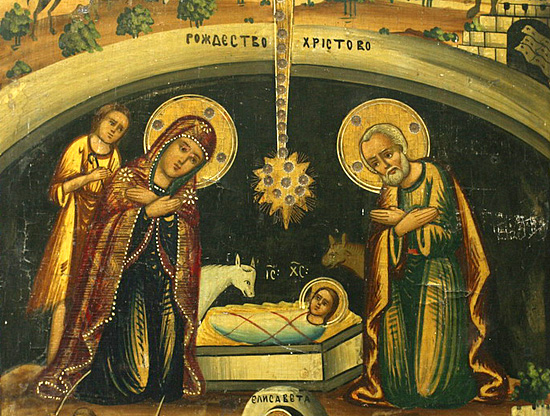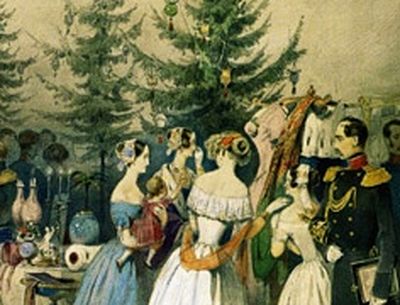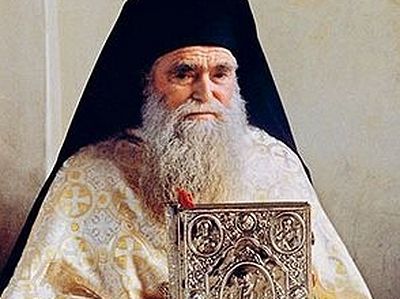Every Church feast is, in essence, a remembrance of that which is most directly relevant to us all: to our lives, to our eternal salvation. Whether a feast of the Lord or Theotokos, or the commemoration day of one of the saints, it’s the same. Therefore, we can also put it like this: a feast is a remembrance of joy—or its source.

Although of course, every feast has its own joy, different from the others. And we all experience and feel it differently, depending on our dispensation, our spiritual condition, and our circumstances in life. And sometimes it even happens that we don’t feel it—so corpulent and unfeeling are our hearts. Or, conversely, we carnally seek not spiritual, but earthly joy. Or we are so crushed by cares and worldly burdens, downcast and wearied by sorrows.
But the joy of Christmas… is at times able to break through even the most closed heart, and warm and revive it.
No, it seems, nothing would better reveal the essence, the inner content of the feast, than the Church services. The words of the canons and stichera, troparia and kontakia shed wondrous light and warmth into the hearts of those attentive to what is being read and sung in the services. The mind embraces them and sends them to the heart, and there they blossom forth, as if the buds of some wondrous, beautiful flowers…
So it should be ideally, and sometimes it so happens in reality. But we all know that it is not always so, by no means always. Is it really so rare that we stand in church on Christmas night, dead tired, dreary because we didn’t manage to sleep enough, hungry because we’ve been fasting for forty days, and struggling with all of this: fatigue, hunger, sleep? And maybe the church we went to is “not ours,” but just the one closer to our house, and the choir, perhaps, doesn’t sing so clearly that every stichera can be understood, and the reader reads quietly and inarticulately. But, all the same, into the heart, droplet by droplet, beam by beam penetrates joy, as if the sun is rising…
Why?
I very well remember the first Nativity service that I ventured to endure twenty-some years ago. Endure—precisely so. At that time I understood nothing about the service. I didn’t really know what the Church is. I hadn’t read from start to finish even one spiritual book, except the Gospels. Church Slavonic seemed to my ear like some kind of Chinese puzzle, and it seemed easier to master this puzzle than to enter into the meaning of the resounding chants. But all the same I went to church on that cold night and stood there—in such a multitude, so cramped, that no one had to explain to me why believers in Christ are in essence one, single body… And I was happy. Not because I had completed probably the first fast in my life, not because I had lasted to the end of this service so foreign to me, and not from the awareness that I had “endured,” but a simple happiness—some kind of childlike, pure joy, thanks to which you become a child and begin to hope that, no matter how bad you are, the Kingdom is for you.
Why?
I recall another. I was already living in the monastery and, of course, knew much more about the Church. I read the holy fathers. I was in church morning and evening and studied the order of the services so as not to get confused and make a mistake. If I couldn’t make out something being sung or being read, then I myself carefully read what I couldn’t understand by ear from the Menaion or Triodion. It was winter. Nativity, Christmastide, and Theophany were already behind us. I received a letter. It was from the army, from my good friend. It was difficult for him there, as it usually is for a young man in the army. But even more difficult for him was that his quite young faith was subjected to trials in the army, with no one around him to support, advise, or instruct him.
His soul was tormented by it, and suffered. He was despondent. The fast came, but fasting was impossible. To go to church and to confess and commune was even moreso. From all of this and from internal sufferings, open only to the gaze of God, my friend felt as bad as possible. And mainly, he felt how far he was from God. And he felt, perhaps, like some kind of stable, only not that one where the Divine Infant appeared in the world, but just a sty.
The night of Nativity arrived. It was similar to all other nights in this military unit, except that for him it was special—especially sorrowful. He sat alone and thought, about everything—about life, about the service, about how weak he was in his faith.
And suddenly in that night, in this loneliness a light was clearly shed.
“I suddenly felt,” he wrote in his letter, “strongly, with my whole heart: the Lord has come into the world. He came to all, and to me. And despite everything, it all became alright…”
This is the joy of the Nativity. It’s similar to the joy of the traveler, desperate to break through a storm, who suddenly finds shelter; to the joy of the dying man who unexpectedly returns to life; to the joy of the child who thought he was an orphan, but no, he has a father and mother. Simply—it’s the joy of a child.



